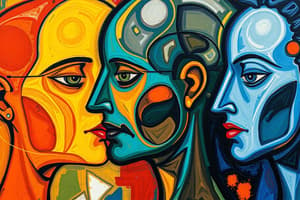Podcast
Questions and Answers
What are the erogenous zones associated with the Oral Stage in Freud's psychosexual theory?
What are the erogenous zones associated with the Oral Stage in Freud's psychosexual theory?
Mouth
At what age does the Anal Stage typically begin according to Freud's psychosexual theory?
At what age does the Anal Stage typically begin according to Freud's psychosexual theory?
Around eighteen months
What complex is formed during the Phallic Stage in Freud's psychosexual theory?
What complex is formed during the Phallic Stage in Freud's psychosexual theory?
Oedipus complex (male) or Electra complex (female)
What is the primary erogenous zone associated with the Anal Stage?
What is the primary erogenous zone associated with the Anal Stage?
What is the final stage in Freud's psychosexual theory?
What is the final stage in Freud's psychosexual theory?
What is the main focus of the oral stage according to Freud's psychosexual theory?
What is the main focus of the oral stage according to Freud's psychosexual theory?
How does successful completion of the phallic stage impact an individual's development?
How does successful completion of the phallic stage impact an individual's development?
What characterizes the latency stage in Freud's psychosexual theory?
What characterizes the latency stage in Freud's psychosexual theory?
When does the genital stage according to Freud's psychosexual theory begin?
When does the genital stage according to Freud's psychosexual theory begin?
What key aspects are associated with the genital stage in Freud's psychosexual theory?
What key aspects are associated with the genital stage in Freud's psychosexual theory?
Flashcards are hidden until you start studying
Study Notes
Freud's psychosexual theory posits that the development of human personality occurs during five stages in childhood. These stages are marked by erogenous zones located along the body from head to toe and correspond to different age groups. Each stage plays a crucial role in shaping the individual's character and functioning throughout life.
The five stages of Freud's psychosexual theory are:
-
Oral Stage: This stage begins at birth and lasts until approximately two years of age. During this time, the child's mouth is considered an erogenous zone, making them prone to biting, sucking, and exploring objects within their environment. A well-adjusted person from this stage would have strong impulse control, social ease, and good self-esteem.
-
Anal Stage: This stage starts around the age of eighteen months and ends when the child is approximately three to four years old. In this phase, the rectum serves as the primary erogenous zone. The child learns to control bowel movements and may develop concepts related to power, possessiveness, orderliness, and cleanliness. Healthy outcomes from this stage can result in a sense of discipline, responsibility, independence, and efficiency.
-
Phallic Stage: This stage takes place roughly between the ages of three to six. Children experience sexual curiosity and the formation of the Oedipus complex if they are male or Electra complex if they are female. They may start developing gender identity and form intense relationships with parents of the opposite sex. Successful completion of this stage could lead to increased ego strength, improved self-concept, and enhanced capacity for loving others.
-
Latency Stage: From around the age of six to puberty, children enter the latency stage where sexual interests decrease significantly. However, conflicts from earlier stages may still influence the individual's behavior. This period is characterized by a focus on school performance, peer relationships, and identity formation.
-
Genital Stage: Starting at puberty and lasting into adulthood, individuals usually resolve unconscious conflicts and redirect their libidinal energy towards adult, heterosexual relationships. It is also associated with a commitment to work, creativity, and the assumption of societal roles.
In summary, Freud's psychosexual theory suggests that personality development unfolds through these five stages, each influenced by various factors such as environmental stimuli, parental dynamics, and personal experiences. Understanding these stages can help us appreciate how early childhood shapes our emotional and psychological profile later in life.
Studying That Suits You
Use AI to generate personalized quizzes and flashcards to suit your learning preferences.



